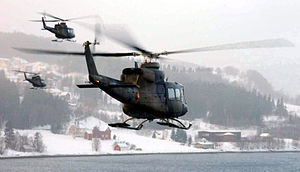 Image via WikipediaUSAID OIG reviewed USAID/Afghanistan's Portion of the Embassy Air Program and reports that the $361 million air ride 2-year contract was providing "safe and reliable service" in support of provincial reconstruction teams (PRTs) and other U.S. development assistance programs in Afghanistan. The report also says that the no-show passengers are costing the government roughly $14 million annually. It recommends a no-show charge of $50 - $100 per occurrence, which USAID/Afghanistan disagrees with. Excerpts below:
Image via WikipediaUSAID OIG reviewed USAID/Afghanistan's Portion of the Embassy Air Program and reports that the $361 million air ride 2-year contract was providing "safe and reliable service" in support of provincial reconstruction teams (PRTs) and other U.S. development assistance programs in Afghanistan. The report also says that the no-show passengers are costing the government roughly $14 million annually. It recommends a no-show charge of $50 - $100 per occurrence, which USAID/Afghanistan disagrees with. Excerpts below:
Because of Afghanistan’s poverty and decades of war and neglect, much of the country’s infrastructure, including roads and air transportation infrastructure, is in very poor condition. Therefore, USAID/Afghanistan, which needs safe and reliable air transportation to carry out foreign assistance, contracted with a private company for transportation and freight services.
On January 4, 2010, USAID/Afghanistan awarded Aircraft Charter Solutions Inc. a $361 million, 2-year contract to supply passenger, cargo, and combination air transportation. The contract runs through February 1, 2012, with an option to extend for the next 3 years. As of March 29, 2011, the mission had disbursed $54 million of the $59 million obligated under the contract.
The contractor is providing turnkey fixed-wing and rotary-wing aircraft, personnel, equipment, tools, material, maintenance, spare parts, and supervision necessary to provide air transportation between various locations in Afghanistan. Aircraft provided by the contractor include seven 18-passenger Beechcraft 1900s, three 8-passenger Beechcraft Super King Air 200s, two Bell 412 helicopters, and four MI-8 helicopters.
[...]
The review found that USAID/Afghanistan’s portion of the Embassy Air program was providing safe and reliable air service in support of provincial reconstruction teams and other U.S. development assistance programs in Afghanistan. The review also found areas in which the Embassy Air program could be improved:
- No-show passengers increased costs to the government (page 4).
- The environmental requirements in the contract with Aircraft Charter Solutions Inc. are ambiguous (page 5).
- Unapproved international travel led to questioned costs (page 6).
- The contractor did not meet branding and marking requirements (page 7).
- The contractor did not provide required terminal-to-aircraft transportation (page 9).
- The contractor did not report required performance information to USAID (page 9).
To address these findings, the report offers some recommendations including the following:
- Implement a nominal charge for no-show passengers (page 4).
- Determine the allowability of and recover, as appropriate, unsupported questioned costs of $525,467 representing international travel (including premium-class travel of $31,902) by contractor officials that was not approved by USAID as required (page 7).
[N]o-show passengers obligate the contractor to operate aircraft with empty seats and impede the efficiency of the USAID portion of the Embassy Air program. A total of 9,573 (20 percent) of the 48,960 passengers with reservations on Embassy Air between February 1, 2010, and January 31, 2011, did not appear for their flights or did not cancel their reservations 24 hours in advance as required, and were not penalized.
The seats reserved for no-show passengers could have been made available to other passengers. In some cases, smaller aircraft could be have been used if no-show passengers had canceled their reservations as required, and in a few cases, flights could have been canceled entirely. We estimate that the cost of making air service available to no-show passengers is roughly $14 million per year (this represents 20 percent of the annual contract cost).
Implementing a nominal fee, on the order of $50 to $100 per occurrence, to be paid by no-show passengers would significantly reduce their number. Of course, to be effective, the fee should not be reimbursed by the U.S. Government except in rare cases where the passenger’s failure to cancel a reservation or appear for a flight is beyond the passenger’s control. This practice would be consistent with current commercial and government practices that impose charges on travelers who negligently fail to cancel reservations.
According to the OIG report, USAID/Afghanistan did not agree with their recommendation for two reasons:
- The mission estimated that up to 50 percent of no-shows were due to security restrictions and were largely beyond the control of individual travelers.
- The mission believed that imposing nominal charges on no-show passengers would not be feasible, although the mission did not identify any specific feasibility issues.
The mission also disagreed with our estimate of funds that could be put to better use by reducing the number of no-show passengers. The mission noted that there may be no significant difference in cost between flying a plane that is fully loaded with passengers and one with a number of empty seats.
In response to the mission’s first point, the Office of Inspector General/Afghanistan undertook an analysis of the reasons for no-shows and determined that only 6 percent of no-shows were due to security restrictions, while 94 percent of no-shows were unrelated to security. In response to the second point, without further details, we do not see any insurmountable obstacles to charging no-show passengers some nominal amount to encourage them to honor their reservations or cancel them as required.
Active links added above. Read in full: Review of USAID/Afghanistan's Portion of the Embassy Air Program (Report Number F-306-11-004-S)
Related post:
Embassy Air Iraq: Tickets Available Soon...In the Meantime, Fire Up Your Brooms | Thursday, June 2, 2011



No comments:
Post a Comment